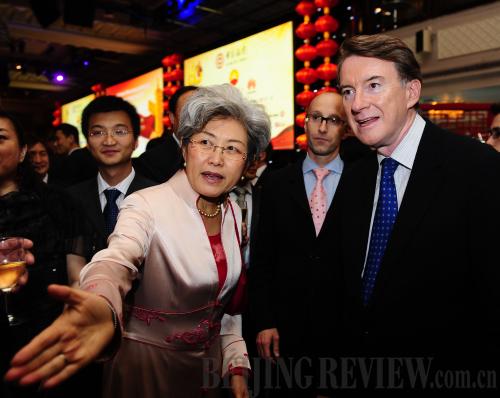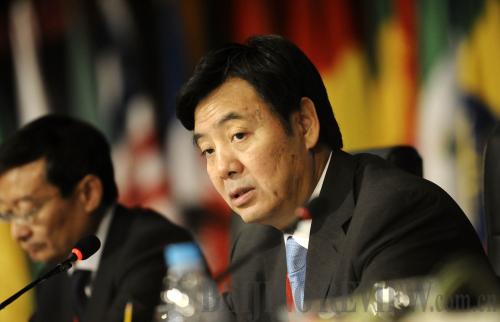|
Grassroots experience
 |
|
HIGH-LEVEL HOSPITALITY: Fu Ying accompanies British Secretary of State for Business, Innovation and Skills Peter Mandelson during the National Day reception at China's Embassy in London on September 24, 2009 (ZENG YI) |
Promoting Party cadres and government officials from those who are working at the local level is an important task of the new outline, as well as extending the principle of "appointing leadership to local government posts to obtain experience," which was a clause from the 2000 plan.
The recent major reshuffling features an apparent exchange of central and local government officials. Luo from the State Ethnic Affairs Commission, Sun of the General Administration of Customs and Wang from the State Council Information Office were all transferred to ministerial leadership posts from local governments. At the end of 2009, Assistant Minister of Finance Zhang Tong was appointed to become the vice governor of Hubei Province; Minister of Agriculture Sun Zhengcai was transferred to northeast China's Jilin Province to become the provincial Party chief; and Sun was replaced by Han Changfu, Governor of Jilin Province.
Luo once worked in the publicity department of the CPC committee in an autonomous county in Guangxi Zhuang Autonomous Region before becoming the Party secretary for the Ethnic Affairs Commission of the region.
The experience helped shape Luo's leadership style. After being the chief of Guangxi's Ethnic Affairs Commission in 2003, he explained the Law on Regional Ethnic Autonomy to the public and the media on many occasions. He also worked to solicit netizens' suggestions for the government. While attending the Second Session of the 11th National People's Congress (NPC) as a deputy in March 2009, Luo said that the Guangxi Government received more than 480 online suggestions while revising regulations on the non-public economic sector in 2008.
The new Vice Minister Sun of the General Administration of Customs was working as the chief of Shanghai Customs for five years. During his tenure, he supported building Shanghai into an international trade and shipping center.
Han, who became the minister of agriculture at the end of 2009, graduated from the Department of Agricultural Economics at Renmin University of China. Before Han was appointed as the Executive Vice Minister of Agriculture in August 2001, he worked in a leadership office on financial and economic issues under the CPC Central Committee. While working at these two posts, Han inspected the economy and agricultural sector in more than half of China's counties and cities.
In December 2006, Han was transferred to Jilin to become its acting governor. During his term, Han frequently visited the rural areas of the important agricultural province to monitor farmers' purchases of government-subsidized farming machines and scientific research programs at Jilin Agricultural University.
 |
|
DIPLOMATIC TALKS: Zhai Jun attends the Seventh Summit of the Forum on China-Africa Cooperation that was held in Egypt in November 2009 (ZHANG NING) |
Liu Xutao, a professor at the Chinese Academy of Governance, said officials from Central Government ministries used to have few opportunities to take on leadership posts in local governments, but the exchange of officials has intensified over the last decade. Liu said local government experience has become a major promotion criterion for officials looking to land national leadership posts.
Female leadership
The promotion of female leaders has become a characteristic of the latest reshuffling of provincial and ministerial officials. Fu, a veteran diplomat and incumbent Chinese Ambassador to the UK, is the second female vice foreign minister of the People's Republic since 1949.
When she was appointed to be China's ambassador to the Philippines in November 1998, Fu, an ethnic Mongolian, became the country's first female ambassador from an ethnic group as well as the youngest woman ambassador ever. When Fu was transferred back home to head the ministry's Department of Asian Affairs in 2000, she became the second female director of the department. Under her leadership over the next four years, she coordinated talks for establishing strategic partnerships between China and the Association of Southeast Asian Nations and the six-party talks to solve the nuclear crisis in North Korea. Before becoming the country's ambassador to the UK in 2007, Fu was China's ambassador to Australia for four years.
The media has shown great interest in Fu's promotion because of her ability to use Western media outlets to explain China's stance. After participating in the Olympic torch relay in London, Fu wrote an article for the Sunday Telegraph in April 2008 that expressed her disappointment in seeing the torch relay in London and Paris harassed by protesters. She attributed the European public's misconceptions about China to the Western media's biased coverage of the country. After reading Fu's article, many wrote to the Chinese Embassy in London to support the Beijing Olympics and the ambassador's views.
Another prominent female rising out of the reshuffle is Sun Chunlan, who left her position as the vice president of the All-China Federation of Trade Unions to become the Secretary of the CPC's Fujian Provincial Committee. Sun, China's only incumbent female provincial Party head, is expected to excel because of her rich experience dealing with business and other issues from Taiwan, which is separated from Fujian by the Taiwan Straits.
Wu Jiang, head of the Chinese Academy of Personnel Sciences, said one reason behind China's shortage of female political leaders is that the existing economic-growth-based evaluation system for local government officials conflicts with women's leadership styles. "To have gender-balanced political leadership, we need a comprehensive reform on leaders' assessment and selection systems," Wu said.
Wu wrote in a paper in December 2009 that statistics show the proportion of women among China's local government leaders has been declining. His paper suggested giving women an opportunity to show their leadership qualities.
Professor Liu said the decrease of Chinese female government leaders compared to 30 years ago is related to the social transition the country is experiencing. "We already have plenty of women as deputy leaders of local governments and government organizations. But China's social transition will only be deemed to have concluded when a large number of women become heads of government organizations and state leaders," said Liu.
(The article is based on a report by Wang Jiamin in the January issue of the Beijing-based China Newsweek) | 